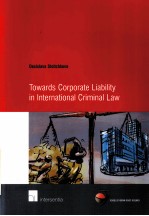图书介绍
TOWARDS CORPORATE LIABILITY IN INTERNATIONAL CRIMMINAL LAW DESISLAVA STOITCHKOVAPDF|Epub|txt|kindle电子书版本网盘下载

- ANTWERP-OXFORD-PORTLAND 著
- 出版社: INTERSENTIA
- ISBN:9400000243
- 出版时间:2010
- 标注页数:240页
- 文件大小:12MB
- 文件页数:250页
- 主题词:
PDF下载
下载说明
TOWARDS CORPORATE LIABILITY IN INTERNATIONAL CRIMMINAL LAW DESISLAVA STOITCHKOVAPDF格式电子书版下载
下载的文件为RAR压缩包。需要使用解压软件进行解压得到PDF格式图书。建议使用BT下载工具Free Download Manager进行下载,简称FDM(免费,没有广告,支持多平台)。本站资源全部打包为BT种子。所以需要使用专业的BT下载软件进行下载。如BitComet qBittorrent uTorrent等BT下载工具。迅雷目前由于本站不是热门资源。不推荐使用!后期资源热门了。安装了迅雷也可以迅雷进行下载!
(文件页数 要大于 标注页数,上中下等多册电子书除外)
注意:本站所有压缩包均有解压码: 点击下载压缩包解压工具
图书目录
1 Introduction1
Ⅰ Corporations, conflicts and human rights1
Ⅱ The rise of corporate social responsibility5
Ⅲ Regulation at the domestic level7
Ⅲ.1 Criminal liability7
Ⅲ.2 Liability through civil courts9
Ⅲ.3 Non-mandatory mechanisms11
Ⅳ International regulation12
Ⅳ.1 'Soft-law'initiatives12
Ⅳ.2 The International Criminal Court13
Ⅳ.3 Some post-Rome developments17
Ⅴ Central question18
Ⅵ Method and structure20
2 Criminal responsibility and the corporate entity23
Ⅰ Introduction23
Ⅱ The criminology of international corporate crime24
Ⅱ.1 Conceptualising corporate crime24
Ⅱ.2 Corporate crime in international context27
Ⅲ The morality paradigm and corporate liability28
Ⅲ.1 Can corporations be regarded as persons?29
Ⅲ.2 Moral agency and moral responsibility30
Ⅲ.3 Legal personhood and moral responsibility32
Ⅳ Guilt and punishment of collectives33
Ⅳ.1 The moral guilt contention35
Ⅳ.2 Collective legal guilt and the position of the individual36
Ⅳ.3 Accountability, culpability and due process38
Ⅴ Conclusion41
3 Corporate accountability a la Nuremberg43
Ⅰ Introduction43
Ⅱ The Nuremberg 'collective criminality' model44
Ⅱ.1 The doctrine of conspiracy44
Ⅱ.2 The concept of criminal organisations46
Ⅱ.3 A missed opportunity vis-a-vis corporate accountability?50
Ⅲ The Nuremberg prosecution of industrialists53
Ⅲ.1 An overview of domestic military trials53
Ⅲ.2 Synthesising the Nuremberg principles of individual criminal responsibility in relation to corporate officials56
Ⅲ.3 The implicit denunciation of corporations as accessories to Nazi crimes58
Ⅳ The legacy of Nuremberg61
Ⅴ Conclusion63
4 Collective criminality and the Rome Statute65
Ⅰ Introduction65
Ⅱ The 'common purpose' doctrine67
Ⅱ.1 Joint criminal enterprise: doctrinal overview67
Ⅱ.1.1 The elements of joint criminal enterprise as a mode of liability68
Ⅱ.1.2 Jurisprudential attempts at counteracting the drawbacks of the JCE doctrine70
Ⅱ.1.2a The customary law origins of JCE70
Ⅱ.1.2b The inherent complexities of extended JCE72
Ⅱ.1.2c Critical appraisal of the ad hoc tribunals' approach to JCE74
Ⅱ.2 The 'common purpose' concept in the Rome Statute76
Ⅱ.2.1 The divergent nature of Article 25(3)(d) RS78
Ⅱ.2.2 A redundant provision?79
Ⅲ The concept of superior responsibility82
Ⅲ.1 Brief historical survey of the development of the doctrine8
Ⅲ.2 Superior responsibility under the Rome Statute83
Ⅲ.2.1 The components of superior responsibility as a mode of liability84
Ⅲ.2.1a The existence of a superior ?subordinate relationship85
Ⅲ.2.1b The cognitive requirement for superior responsibility87
Ⅲ.2.1c Activities within the effective responsibility and control of superiors89
Ⅲ.2.1d The duty of superiors to act91
Ⅳ Conclusion93
5 The criminal liability of corporationswithin the Rome Statute framework95
Ⅰ Introduction95
Ⅱ The ambit of actus reus and mens rea in the Rome Statute96
Ⅱ.1 Acts and omissions96
Ⅱ.2 The dolus directus facet of Article 30 RS97
Ⅱ.3 Dolus eventualis as a form of volition?98
Ⅱ.4 Culpa-type liability under the Rome Statute101
Ⅲ Utilising the current Rome Statute provisions102
Ⅲ.1 Indirectly implicating MNCs on the basis of individual convictions102
Ⅲ.2 The notion of complicity as an avenue for corporate liability103
Ⅳ Direct corporate criminal liability sui generis108
Ⅳ.1 The criminal responsibility of corporations 'in the draft'108
Ⅳ.1.1 Declarations of criminality109
Ⅳ.1.2 Liability along vicarious lines110
Ⅳ.2 Domestic approaches to corporate criminal liability113
Ⅳ.2.1 The principle of aggregation113
Ⅳ.2.2 Proactive and reactive fault115
Ⅳ.2.3 The corporate ethos approach117
Ⅳ.2.4 Constructive corporate fault118
Ⅳ.3 The constructive method and international crimes121
Ⅳ.3.1 Setting the subjective threshold of corporate liability121
Ⅳ.3.1a The dolus eventualis standard of corporate misconduct122
Ⅳ.3.1b Culpa as a benchmark for corporate criminal responsibility125
Ⅳ.3.1c A word on dolus specialis133
Ⅳ.3.2 The scope of the objective element134
Ⅴ Conclusion137
6 Culpability beyond the confines of the corporate form139
Ⅰ Introduction139
Ⅱ Direct parent liability140
Ⅱ.1 The intrinsic protections of the corporate form140
Ⅱ.2 Justifying the attribution of criminal responsibility to parent companies142
Ⅱ.3 The criteria for ascribing direct liability to parent corporations143
Ⅱ.3.1 The duty to intervene146
Ⅱ.3.1a Authority147
Ⅱ.3.1b Awareness148
Ⅱ.3.2 The power to intervene149
Ⅱ.3.2a Control150
Ⅱ.3.2b Causality155
Ⅲ Direct criminal responsibility and supply chain dynamics156
Ⅳ The superior responsibility of corporate officials159
Ⅳ.1 Superior - subordinate relationships and the 'effective responsibility and control' test161
Ⅳ.2 The cognitive requirement and the corresponding failure to act163
Ⅴ Conclusion165
7 Conclusion167
Ⅰ Overview167
Ⅱ Prospects along the regulatory continuum169
Ⅱ.1 The complementarity contention pertaining to 'inaction' and 'inability'170
Ⅱ.2 Alternatives to corporate criminal liability and the implications for the principle of complementarity171
Ⅱ.3 Non-criminal regulation - a viable option for the ICC?173
Ⅲ The pitfalls of collective criminality174
Ⅲ.1 The imperative of aligning accountability with due process176
Ⅲ.2 Collective punishment: effects on the 'innocent' bystander?179
Ⅳ Liability of MNCs in international criminal law: from aspiration to reality182
Ⅴ Corporate accountability and the goals of international criminal justice184
Ⅴ.l The 'problem' of plea bargaining186
Ⅴ.2 Deterrence, retribution and the expressive function of (international) criminal law187
Summary191
Samenvatting197
Selected legal provisions205
Bibliography211
Table of cases223
Table of UN and other documents229
Index231
Curriculum vitae235